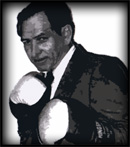The Greatest Knockout Artist
of All time: Alcohol
By 1915 Harry Greb was a household name and taking on world class competition. His meteoric rise put him in the ring against champions Tommy Gibbons and George Chip. At that time, boxing had been forbidden by New York ’s Frawley Law in 1911 (There was also the Walker Law) from rendering decisions due to the nature of the sports brutality, .political shenanigans, and gambling influences. Many other states upheld the law. To counter the edict the boxing moguls put their brains to the test and came up with a temporary solution: certain game experienced newspaper reporters who witnessed the fight would give their decision the next day if there was no knockout. Consequently, Greb took the short end of the stick against Gibbons and Chip. No problem, he would later make amends through experience and exposure. By the time 1917 rolled around Greb didn’t spend much time in the gym as he took on thirty seven great fighters. He won thirty four bouts including triumphs over light heavy champion, Battling Levinsky, former light heavy champion Jack Dillon, his former nemesis George Chip and Willie Meehan who had previously defeated heavyweight Jack Dempsey. Then in early 1918, he lost a close bout to future middleweight champion, Mike O’Dowd. That loss really got him peeved. He continued with his wicked bi-weekly fight schedule and beer and champagne night parties and for the next two years was unbeaten and untouchable. He physically tore up a few heavyweights including Billy Miske, Gunboat Smith, Mike McTigue, and Bill Brennan. In what could have been a championship win, he swarmed all over Al McCoy on April 30th at Exposition Hall in Pittsburgh . However, he had to win by a KO to gain the title and McCoy went the distance to a ND. Greb even opted to get a fight with Battling Levinsky, one of the all-time great light heavyweight champions. Levinsky’s people were determined their man could whip the ‘ Iron City Express.’. In an incomprehensive series that began that year and into the next few years Greb whipped Levinsky some five times. Was Levinsky’s management thinking or were they just too stubborn not to think? Finally, they avoided Greb and Levinsky made his own mark in boxing annals. However, each victory over Levinsky provided Greb the bucks to booze, hire orchestras and dance through the night and into the light of day.
The O’Dowd loss only served to motivate Greb to start using his punching power more rather than relying on his patented windmill style and a superb defense of avoiding toe-to-toe slugfests. He played his cards right and pulverized opponents over the next two years without losing a single fight. Finally, after a sensational late knockout win over Kid Norfolk in 1921, Greb was given a shot at the American Light heavyweight Championship against non other then undefeated Gene Tunney. He took the fight despite the fact that Norfolk had out – dirtied him with the thumbs and damaged the retina in his right eye. Nevertheless, Greb wasn’t about to waste the opportunity to fight for a title, even at the greater weight advantage Tunney would have. After all, he had beaten dozens of light heavyweights and heavyweights. Tunney had no idea of the danger that lie ahead; no clue as to the old adage, “Speed is the only answer.” He would soon be face-to-face in a fierce and grueling battle with the undersized Greb.
The big matchup occurred on May 23rd 1922. Greb jumped on Tunney from the opening bell with his hand speed and both balanced and unbalanced footwork to elude Tunney or blast him from both orthodox and unorthodox angles. Tunney was confused and found nothing but air with most of his punches. Figuring that Greb would falter from the rapid punching and quick adjustments to avoid Tunney’s power in the later rounds, Tunney went into a shell for many rounds and hiked his trunks so the referee would warn Greb for hitting low. That tactic didn’t faze Greb as he pin-pointed punches to Tunney’s eyes, body and especially his nose, sometimes with the heel of his hand and often with a knee to the groin to open up the bigger man. Instead of working in Tunney’s favor, his protective stance made him such an easy target for Greb who was able to sit down on his punches and torque away with deadly combinations. Yes boxing aficionado’s Greb could punch with the best of them and he proved it by pulverizing Tunney.
Late in the fight, the effects of Greb’s speed and power were evident to Tunney and the huge fight crowd. Tunney was out on his feet in the 13th round from the massive attack by Greb. He was bleeding like a stuck hog from his eyes, nose and mouth. His body was bruised and reddened and he only made it through the 15th round on sheer determination. He was so badly beaten that he had to get medical care after the fight. His nose was completely broken and his eyes ripped apart. When he finally regained his health and composure he told the press that fighting Greb was like fighting a man with eight arms, like fighting an octopus. Greb as usual, did his victory celebration at the local pubs. Soon after, he wanted to fight the Frenchman, Georges Carpentier, who was recognized as the world champion; but not a word crossed the Atlantic in response. So, it was business as usual for Greb and he wasted no time in getting back in the ring.
Next up for Greb was to party, make some money and defend the title. His dominance of Tunney was all the more exceptional due to reports that his rough bout with a much heavier Kid Norfolk on august 29, 1921 led to Greb eye not only damaged but actually causing a detached retina. He overcame an early round deficit to whip the Kid good, rip up his eyes, and easily cruise to a decision in the final rounds. He went to an eye doctor who informed him he had to quit boxing. That didn’t appeal to Greb.
Throwing his eye health to three sheets of the wind, Greb went on a whirlwind winning spree of twelve fights before giving Tunney another title shot. During that blitzkrieg, he whipped another world light heavyweight all-time great and world champion, Tommy Loughran, three times decisively. For the record, Greb whipped Loughran some six times. The latter never could make the proper adjustments to thwart the human windmill. Bob Roper also lost three times to Greb in what today would be billed as MMA fighting. Elbows, laces, thumbs and some wrestling moves were employed by both fighters. In their first fight, Roper had entered the ring with a snake around his neck, possibly an indication of how he was going to put the squeeze on Greb. But it was Roper who was snake-bit once the bell rang. In his book, “The Fearless Harry Greb” Bill Paxton suggests that though Norfolk may have been the one to blur Greb’s right eye by thumbing him repeatedly, it was more likely that Roper’s thumbing led to the detached retina. No bother, Madison Square Garden awaited the magnificent artists of the ring, Greb and Tunney, on February 23rd 1923.
In a splendid but referee restrained bout, the bigger Tunney had a new game plan; this time he would set up and counterpunch the over-aggressive Greb. And so it went for fifteen hard-fought rounds with Tunney eking out a decision by points. According to Regis Welsh of the Pittsburgh Post, Greb was hindered from executing his patented style by referee Patsy Haley with some stiff warnings thus making the fight close. William Muldoon, chairman of The New York State Boxing Commission, called the decision an outright “Steal.”
The major developing feud wasn’t over yet. Tunney and Greb would get down three more times over the next couple of years with Tunney gaining one win and a draw and a no decision.. However, the draw on September 17th1924 has recently come under more research and there is a good chance that Greb may be called the winner It is known that two of the three newspapers scoring the fight gave it to Greb.. But say hey ladies and gentlemen, Tunney, other than his infamous long count that saved him in the first Jack Dempsey encounter, officially lost only one fight in his career and that was the mauling he took from Greb. Sugar Ray Robinson never climbed that high of a mountain.
PAGE 2



